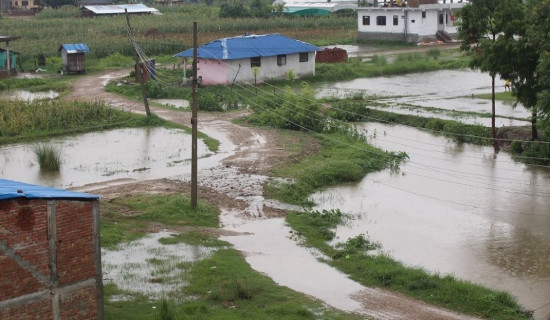- Saturday, 29 June 2024
Tensions boil over renewed headscarf crackdown in Iran prior to election
Dubai, UAE, June 27: Seemingly every afternoon in Iran's capital, police vans rush to major Tehran squares and intersections to search for women with loose headscarves and those who dare not to wear them at all.
The renewed crackdown comes not quite two years since mass protests over the death Mahsa Amini after she was detained for not wearing a scarf to the authorities' liking. A United Nations panel has found that the 22-year-old died as a result of “physical violence” wrought upon her by the state.
Amini's death set off months of unrest that ended in a bloody crackdown, and for a time morality police disappeared from the streets. But now videos are emerging of women being physically forced into vans by police as lawmakers continue to push for harsher penalties. Meanwhile, authorities have seized thousands of cars over women having their hair uncovered while also targeting businesses that serve them.
The renewed hijab push, which police are calling the Noor — or “Light” — Plan, began before President Ebrahim Raisi died in a helicopter crash, and whoever wins a vote to replace the hard-line cleric on Friday will have an influence over just how intense it becomes — and how Iran responds to any further unrest.
“An intervention ... under the Noor Plan will take us into darkness,” reformist presidential candidate Masoud Pezeshkian recently told a group of female supporters
Enforcement began ramping up in April, with videos spreading online showing women having violent encounters with female enforcers dressed in the all-encompassing black chador alongside uniformed police officers.
While police haven't published arrest numbers about the crackdown and media haven't given it major attention, it's widely discussed in Iran. But still, many women continue to wear their hijabs loosely or leave them draped around their shoulders while walking in Tehran.
On a recent afternoon in northern Tehran, women sat in cafes and other public places, as a police officer in his 50s told those passing by: “Please cover yourselves, ladies,” and then muttered audibly: “My God, I am fed up repeating this without getting any attention.”
“We know the police are not eager to fight women, but they are under pressure to,“ said Fatemeh, a 34-year-old math teacher who gave only her first name for fear of reprisal. “Sooner or later, the authorities will realize that it would serve their interests better to pull back.”
Iran and neighbouring Taliban-controlled Afghanistan are the only countries where the hijab remains mandatory — even conservative Saudi Arabia has dialled back on its morality patrols. While women attend school, work and can manage their own lives in Iran, hard-liners insist that the hijab must be enforced.
The garment has long has been entwined with politics in Iran. Former ruler Reza Shah Pahlavi banned it in 1936, part of his efforts to mirror the West. The ban lasted only five years, but many middle and upper-class Iranian women chose not to wear it.
After the 1979 Islamic Revolution, some of the women who helped overthrow the shah embraced the even more conservative chador. But others protested a decision by Grand Ayatollah Ruhollah Khomeini to order women to wear hijabs in public. In 1983, it became law, enforced with penalties including fines and up to two months in prison.
Amini's death in September 2022 sparked months of protests and a security crackdown that killed more than 500 people and saw over 22,000 detained. But less than two years later, hard-liners within Iran's theocracy have pressed forward with a crackdown.
The government's insistence on enforcing the hijab also reflects its conspiratorial view of the world. Iran’s national police chief, Gen. Ahmad Reza Radan, has alleged without providing evidence that the country’s enemies plan to transform the nation’s culture by encouraging women to avoid the veil.
Already, “tens of thousands of women have had their cars arbitrarily confiscated as punishment for defying Iran’s veiling laws,” Amnesty International said in March. “Others have been prosecuted and sentenced to flogging or prison terms or faced other penalties such as fines or being forced to attend 'morality' classes.” (AP)















-original-thumb.jpg)

